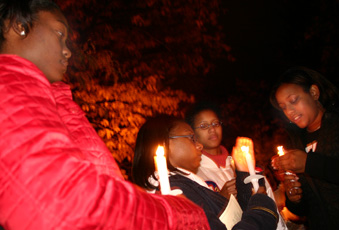Candlelight vigil honors alcohol-related deaths

From left, Jennifer Caples, junior in ALS, Victoria Whiteside, junior in ALS; Tamara Hoff, graduate student; and Mia Layne, senior in ALS; take part in a candlelight vigil Wednesday night on the Quad in honor of those whose lives were lost or affected by Regina Martinez
October 27, 2005
University students and members of the Champaign-Urbana community gathered Wednesday evening on the Illini Union South Patio to remember and honor those whose lives were lost or affected due to alcohol-related incidents.
Attendees of the event stood quietly in a half circle around a single microphone huddled in fall coats. Speakers read poems and spoke of their experiences with alcohol.
With the Rip Chords, a women’s a cappella group, finishing their rendition of “Amazing Grace,” candles were handed out.
“As a community, we are here to support one another,” said Vanessa Torres, a member of the Special Populations’ Student Health Concerns Committee. “These candles represent those we have lost, and those who are struggling with alcohol abuse.”
The soft glow of the candles lit faces as they prepared for a candlelit procession around the Quad.
Get The Daily Illini in your inbox!
The vigil is held annually, normally in conjunction with the national Collegiate Alcohol Awareness Week, although this year the events did not coincide. It is sponsored by McKinley Health Center’s Special Populations’ Student Health Concerns Committee.
“We want to increase awareness,” said Jessica Ivie, graduate student and member of the Special Populations’ Student Health Concerns Committee. “Alcohol-related incidents don’t just mean DUIs. It can mean sexual assault or a number of other things. Every one of us has been effected in someway.”
College students don’t always make the best choices or healthiest decisions when it comes to alcohol, Ivie said.
“I think our message is important,” she added.
During her undergraduate studies at Bradley University, Ivie worked as an intern in an alcohol and substance abuse clinic in Peoria, Ill.
“Through this experience, I was able to see how alcohol can adversely affect the lives of those addicted to it and their friends and families,” Ivie said in an additional e-mail interview.
According to a recent College Task Force report to the National Institute on Alcohol Abuse and Alcoholism, students aged 18 to 24 contribute to an estimated 1,700 student deaths, 599,000 injuries and 97,000 cases of sexual assault or date rape each year. In 2002, an estimated 2.8 million college students drove a car while under the influence of alcohol.
Alcohol consumption can also lead to a wide array of illnesses, including heart disease and chronic liver problems.
Fortunately, B. Ilene Harned, coordinator for the University’s Alcohol and Other Drug Office, said no alcohol-related deaths have been reported at the University.
“We work a lot with training police and housing officials on alcohol poisoning and what to do, so that has had an impact (on preventing student deaths related to alcohol),” Harned said.
According to a 2000 report from the Journal of the American Medical Association, alcohol consumption led to an estimated 85,000 deaths in the United States and accounted for 3.5 percent of deaths. This number does not include deaths of past alcohol drinkers who died from damage of illness from past alcohol consumption.
The Alcohol and Other Drug Office helps to council and inform students who have struggled with alcohol use, Harned said.
“Being arrested or taken to the hospital because of alcohol can be very traumatic,” Harned said. “We want to help them process that and work through it and I think that students are very responsive.”
The Alcohol and Other Drug Office does not only suggest abstinence as a solution for drinking on campus, Harned said.
“What we really want to teach students is that if they make the decision to drink, to do it in a responsible way and to make good, sound decisions when it comes to drinking.” Harned said.






